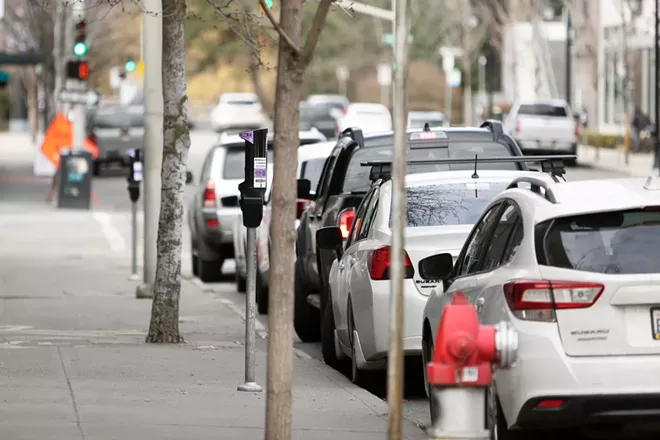
The meter vs. kiosk debate is over — the meters won.
Last week, the Spokane City Council approved a $1.8 million contract to buy 880 single-space and 205 dual-space parking meters. The new meters will be used for the third phase of Spokane's parking enhancement project working to overhaul the city's outdated parking system.
Luis Garcia, Spokane's director of code enforcement and parking services, says the city initially planned to have a large number of parking kiosks — which operate on a pay-by-plate system and cover multiple parking spaces in a given area — in the downtown core. An August 2021 resolution to replace downtown Spokane's parking meters with kiosks touted the former for reducing visual clutter, maintenance and labor costs.
The resolution was eventually tabled after city staff expressed concern about the cost of parking kiosks. Further proposals to add kiosks to parts of downtown were eventually dropped after city staffers suggested kiosks might make it difficult to reserve parking spaces, which is primarily done by business owners. With meters, a simple placard lets drivers know the spot is off-limits for the day.
Outside downtown, Garcia says the city still plans to use kiosks on the north side of the river and in the hospital district, where reservations aren't as common.
Garcia says the city stands to save at least $500,000 by buying new meters instead of kiosks. The new meters — purchased with loans from the Spokane Investment Pool, a fund the city uses to manage its cash reserves, and repaid with parking revenue — will replace the aging, coin-operated meters from the '90s that still operate in parts of the city.
Last summer and fall, the city put $3.9 million toward replacing many of these '90s meters in the downtown core with single- and double-spaced meters from MacKay Meters. There are still a number of older meters on the downtown periphery that need replacing. The new meters the city is buying will go in place of the '90s meters or in spots currently missing meters.
Despite recent updates, City Council member Lori Kinnear, who sits on the city's Parking Advisory Board, thinks efforts to update the city's parking system are still "woefully behind."
"It should be uniform, but we're not there yet," Kinnear says of the city's meter system.
Some of the blame falls on the pandemic, Kinnear says. Revenue from parking meters declined to $1.9 million in 2020 — a 44 percent decline from the previous year. Revenue has since rebounded, but is still lower than it was in 2019.
In October last year, the city fully transitioned to the ParkMobile app for mobile payments at the new meters. The goal is to streamline payments on a single system and make things less confusing.
Kinnear is skeptical of the "reducing confusion" part of the plan. She recalls watching a young guy in his 30s — who presumably understood smartphones — standing at a meter for more than five minutes while trying to figure out how the mobile app works.
"I thought OK, this is not a friendly app," Kinnear says. ♦
